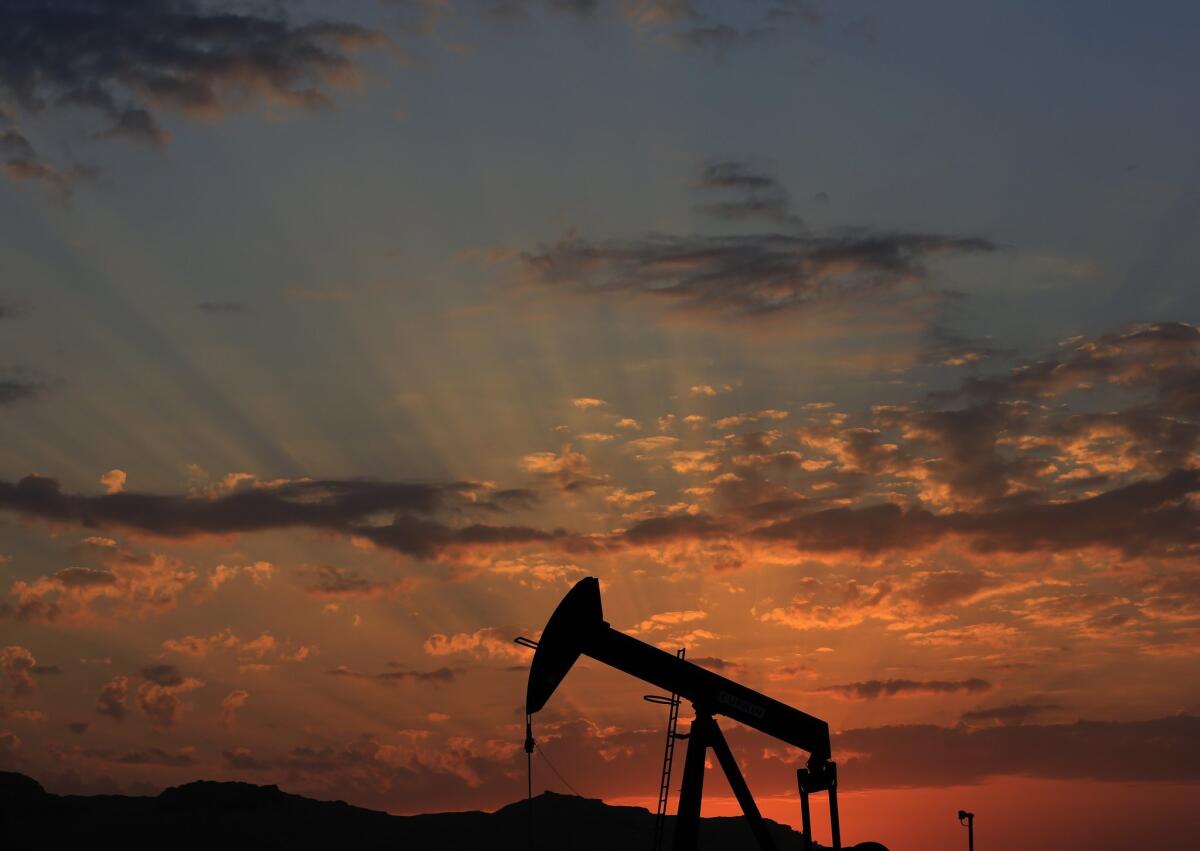Op-Ed: There is a downside to cheap oil. Really.

An oil pump at sunset in the desert oil fields of Sakhir, Bahrain on Dec. 13. Gasoline prices remain low in the United States and are expected to soon drop below $2 a gallon.
- Share via
Oil prices have fallen dramatically to the mid-$30s on the New York Mercantile Exchange from more than $105 per barrel in 2014. Such extraordinarily low prices are affecting global stock markets, big oil exporters and consumers worldwide.
How can we explain this crash and where are oil prices headed?
The global economy is in the doldrums, and China, the world’s biggest oil importer, appears plagued by structural political and economic problems that it may or may not overcome in the next few years. Energy agencies have therefore lowered global oil demand forecasts.
If [oil] prices remain low for too long, that will hurt efforts to address climate change, especially in the U.S., where citizens largely oppose raising oil taxes.
These problems have rattled traders on markets such as the NYMEX.
When traders believe that oil prices will rise, they buy futures in hopes of selling them later for a profit. Their actions increase the price of oil and, eventually, the price of derivatives, such as gasoline and heating oil. That’s not happening now because traders are pessimistic.
What usually happens in such circumstances is that Saudi Arabia attacks the supply side — that is, it cuts production to boost prices. But the Saudis have decided (most recently just two weeks ago) not to do so, probably because they believe that low oil prices have still not done enough to undermine the North American energy boom and hurt their nemesis, oil-rich Iran.
Meanwhile, U.S. shale oil producers haven’t cut back as much as expected. In fact, they are overflowing with oil and are building caverns in which to store hundreds of millions of barrels for when demand returns. Traders see such oversupply as a bearish sign for prices.
Adding to the mix, the U.S. Federal Reserve is likely to raise interest rates repeatedly in the coming years, which should buoy an already strong U.S. dollar. Since oil is traded in U.S. dollars, its strength translates into even lower oil prices.
Finally, although the Middle East is a political mess, its oil supplies are relatively secure. The Iran nuclear agreement has removed, for now, the most likely chance of the type of war — an attack on Iran — that could really spook markets.
Even the Islamic State is not a significant military threat to major oil fields. Sure, the terrorist organization is stealing oil, but what it pumps from the areas it controls is just a drop in the global bucket of oil, even though it makes tens of millions doing it.
Can oil prices rebound?
China’s economy won’t bounce back overnight, nor will that of other countries. The Saudis may decide to cut production in the coming months, but only if they believe that other OPEC countries will follow suit.
As for the U.S. dollar, it’s pretty stable. So long as America is seen as a safer bet for foreign investments than most other places, and so long as the Fed follows through on raising interest rates, the dollar will remain strong.
On the other hand, American frackers will probably (finally) cut back production in the coming months. But that alone can only push prices up so much.
All this pressure on oil prices is just fine for the American and global economy, if not for oil producers. But there is a downside to this story.
The negotiators who struck the recent climate change agreement in Paris want to send a message to the markets; they want to convey that burning fossil fuels is an increasingly costly habit. Unfortunately, low oil prices are sending the exact opposite message.
The upshot is that low oil prices aren’t something to celebrate. Over time, long investment horizons tend to generate boom and bust cycles in oil production and prices. But if prices remain low for too long, that will hurt efforts to address climate change, especially in the U.S., where citizens largely oppose raising oil taxes.
Steve A. Yetiv is professor of international relations at Old Dominion University. He is the author of “Myths of the Oil Boom: American National Security in a Global Energy Market.”
Follow the Opinion section on Twitter @latimesopinion and Facebook
More to Read
A cure for the common opinion
Get thought-provoking perspectives with our weekly newsletter.
You may occasionally receive promotional content from the Los Angeles Times.









